Conceived, designed and executed in India, Altigreen's hybrid engine will help make cars more fuel efficient and the air we breathe cleaner.
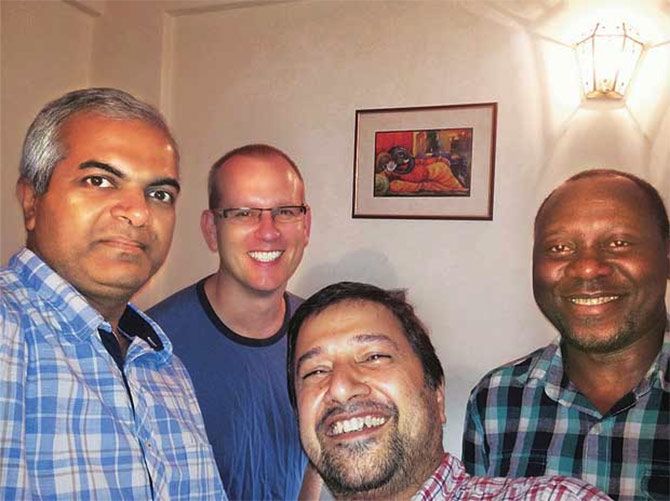
When Amitabh Saran sent the data he collected from some hardware that was attached to his car while driving in Bengaluru, his Norwegian colleague and co-founder Lasse Moklegaard in the US got back to say that the licence of the guy who was driving needed to be revoked.
"He doesn't know how to drive - always braking, changing gears, stopping and then, accelerating. He's wasting tonnes of energy."
At that point, Saran explained to him that the guy driving was Saran himself - this was the way everyone drove in India and that road conditions in most large cities ensured that everyone drove this way.
That's when Moklegaard and Saran concluded that something could be done with this.
If even a small percentage of the energy lost due to bad driving can be recovered, one can use the available resources more efficiently.
Only 25 per cent of the fuel available in a car is used to push the car forward - the rest is wasted in other things such as heat and vibration.
Every activity in the car draws from the same fuel. This holds true even for the most fuel-efficient car models.
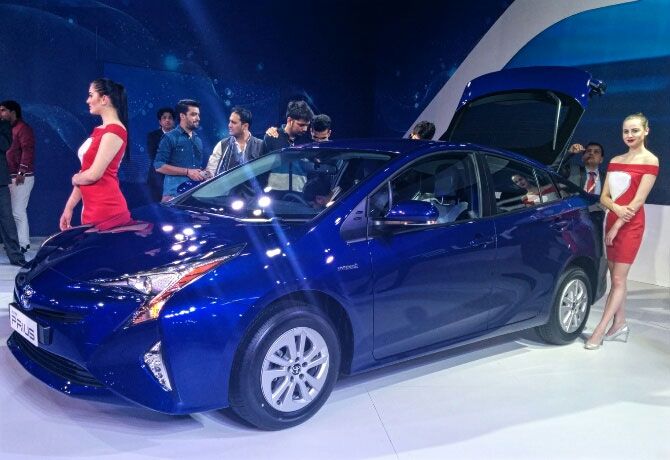
Photograph: Rajesh Karkera/Rediff.com
The idea of setting up Altigreen came up around July-August 2011 when the Toyota Prius - a hybrid vehicle - was launched in India at a hefty price of Rs 32 lakh.
"I was cribbing about it and then, I realised there was no point complaining. I needed to do something about it," says Saran.
At that point, Saran - a PhD in computer science who had gone entrepreneurial in 2000 - was selling his last venture, BuzzinTown, to Yatra and he was soon going to be free to pursue whatever he wanted next.
"Petrol is expensive, diesel is harmful, CNG is not easily available, electricity is not green... So, the only option to my mind was hybrid," says Saran.
Saran always thought hybrid vehicles were better than electric ones simply because electricity is primarily generated through the use of coal.
If one adds transmission losses, a purely electric vehicle ends up being as bad, if not worse, than a petrol-powered machine.
That's when he roped in Moklegaard, a doctorate in control engineering whom he had mentored while Saran himself had studied in the US.
Moklegaard sent the hardware that Saran attached to his car and after some extensive data crunching, Saran and Moklegaard were convinced they had to design and develop an engine that allowed some of the wasted energy to be saved. But, they needed more technical help.
At that stage, Lasse also managed to rope in John Bangura (born in Sierra Leone), a PhD in electro-magnetics who was at the time living and working with UTC on the Boeing 787 engine in the US, a man who "sleeps, eats, breathes, thinks, dreams electric rotating machines" and has several patents to his credit.
When Bangura understood the whole concept, he was excited at the idea of designing the motor and developing an engine that could potentially solve a problem faced by a large part of the developing world, not only India.
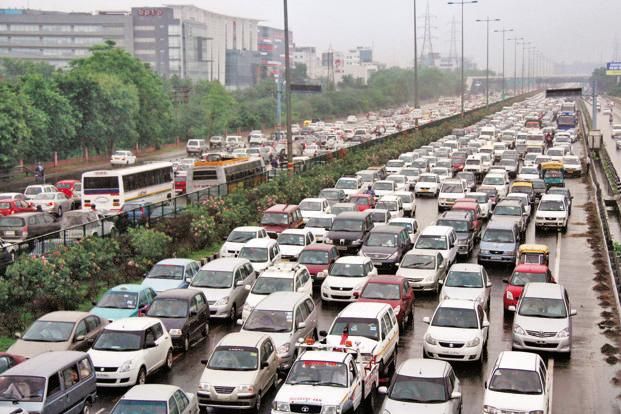
He had seen the same problem in Africa, too - low speeds, excessive use of brakes and gears, and constant accelerating and decelerating.
In 2013, Altigreen was born with the four founders and headquartered out of Bengaluru.
Shalendra Gupta, a former Indian Institute of Management-Ahmedabad graduate, was roped in to manage finance and other aspects of the start-up. Gupta quit his job with BCH Electric to join Altigreen full time.
Before all the partners quit whatever they were doing, they needed to be sure their idea was workable.
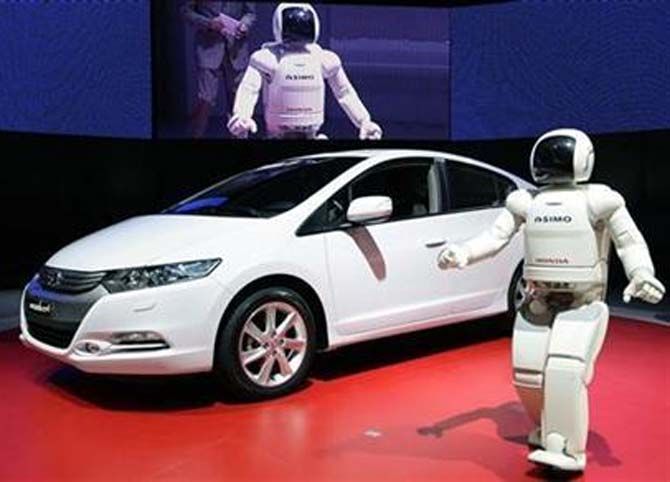
So, they built an experimental prototype of their proposed solution in Iowa, US, using components available off-the-shelf, to demonstrate that an arrangement of motor and software controller similar to the APL proprietary design, can co-exist with an existing car engine, assist in driving the car and provide increased fuel-efficiency.
The experimental prototype was installed on a Pontiac Grand Prix (1999 model) and with the prototype, and the results confirmed that a fuel economy of 10 per cent was achieved.
These tests were conducted over several weeks of test driving.
Then came the toughest part. Getting Indian manufacturers to produce parts and components that would support the design of the kit so that it could be made in India and more importantly be affordable.
Off-the-shelf components of the kind they had used for the prototype would make it too expensive.
Saran explained how after several futile attempts, they finally had a ready Made-in-India affordable kit that could begin to be tested.
Almost simultaneously, in 2012, they also started filing patents in the US and India (eight have been filed so far; of which two have been awarded).
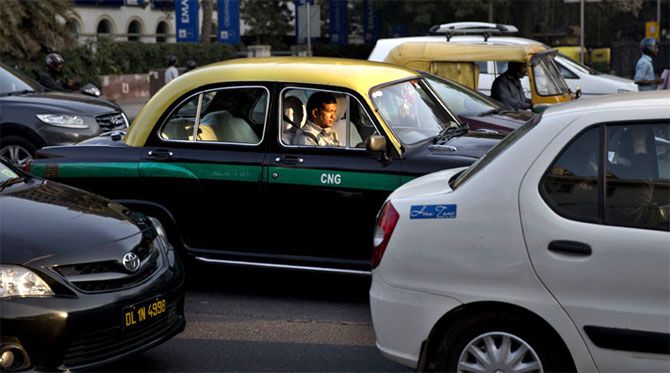
To start with, Altigreen is targeting four-wheeler commercial vehicles in India, both taxi-cabs and light commercial vehicles.
Subsequently, they will focus on personal cars. In India, the total addressable market - according to their estimates - is close to 50 million vehicles over the next 10 years.
Along the way, the company raised seed investment from angel investors in 2013 and 2014.
The latest is a Series-A round, led by Jupiter Capital. Investors include Chetan Maini, founder of the Reva Electric Car Company.
So far, the company has tested and calibrated the kit on multiple vehicles, including petrol and diesel sedans and small trucks.
Pilot field trails are on with cab companies, car rental fleets and a global beverage giant for their intra-city distribution vehicles.
"We have been testing our kit on vehicles since December 2013. It is now in its fifth generation, with continual improvements in price, performance, size and robustness," explains Saran.
The current version has been under test since April 2015, with customer trials starting in October 2015.
FOR A CLEANER ENVIORNMENT
THE PROBLEM
Demand and use of cars is rising. Petrol is expensive, diesel is harmful, CNG is not available, electricity is not Green and hybrid/full-electric OEM vehicles are expensive. So, where does this lead us?
THE SOLUTION
A retrofit hybrid electric kit. A low-cost, aftermarket, retrofit system that transforms a standard vehicle into a hybrid electric vehicle, increasing mileage by over 20% at a price range of Rs 1 lakh ($1,600)
ITS ADVANTAGES
- It is a torque-assist system, working in parallel with the existing internal combustion engine
- It does not require external, plug-in charging from the grid
- The solution is fuel-agnostic, works with petrol, diesel, CNG engines
- The solution is transparent to the driver
- At average usage, pay-back for the customer is 6-18 months.
- There is a 20% reduction in tailpipe emissions











